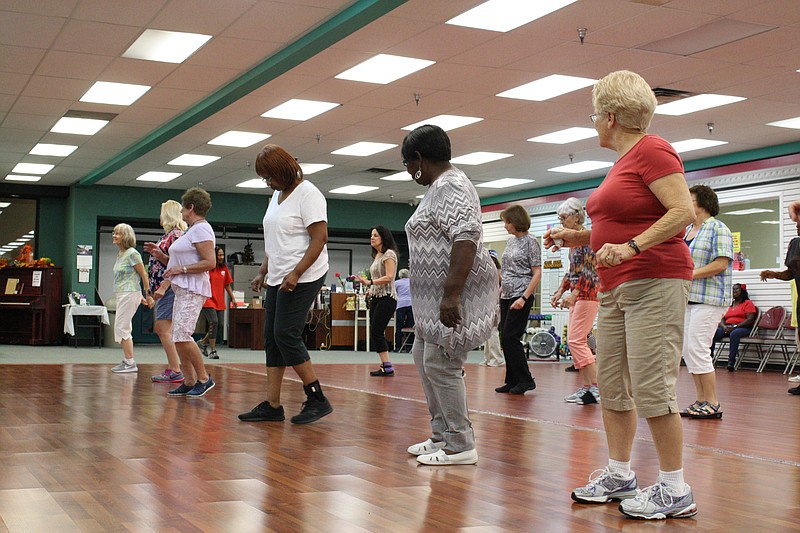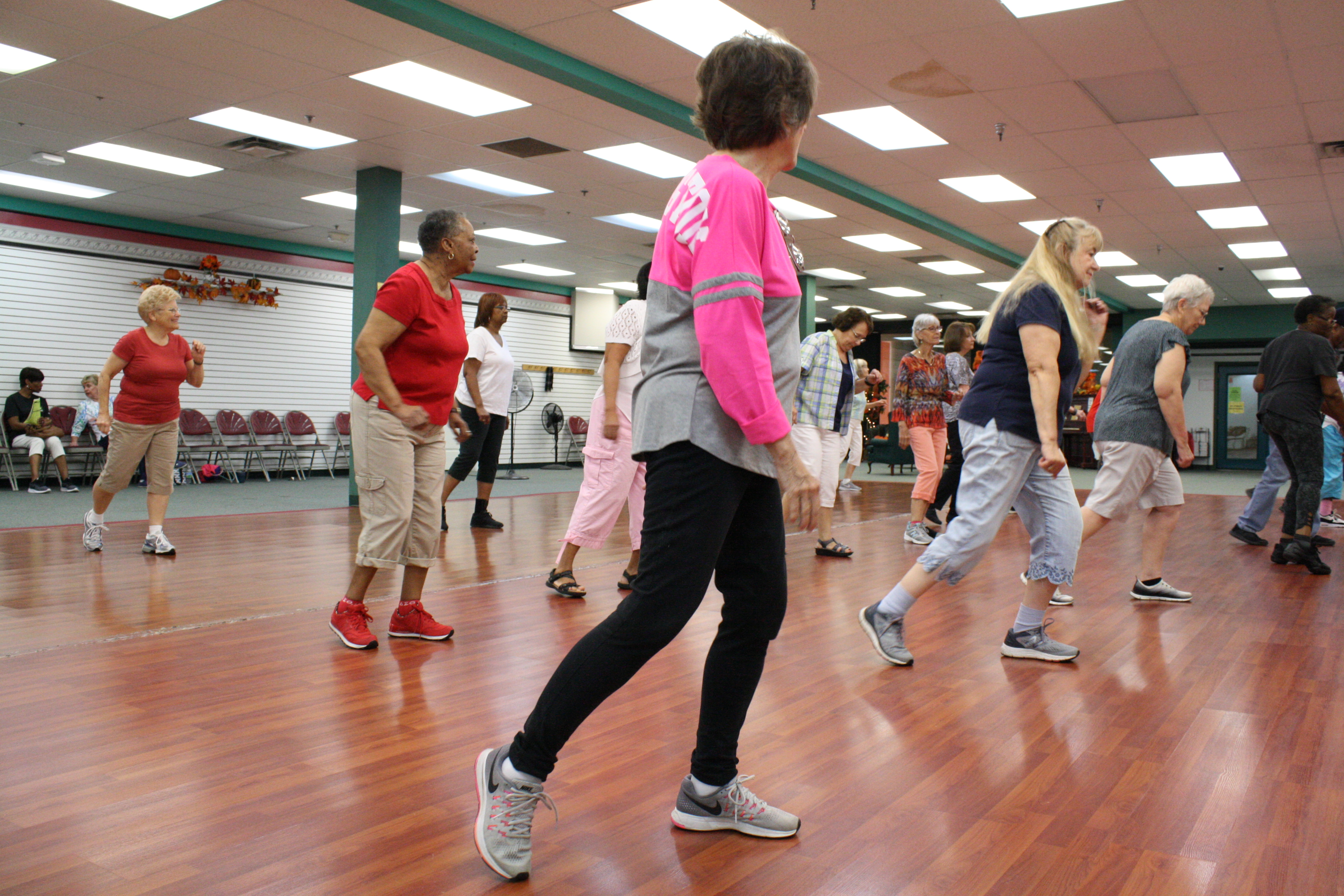Editor's note: This article is part of our series about aging and suicide. It was written with the support of a journalism fellowship from the Gerontological Society of America, Journalists Network on Generations and the Silver Century Foundation.
The Eastgate Senior Activity Center is a happening place.
On an average day, between 65 and 90 adults age 50 and older gather for the jam-packed schedule of mostly free activities ranging from aerobics and line dancing to Bible study and table tennis.
"Unfortunately, the image embedded in people's mind is that when you get to a certain age your body is going to shut down," said facility manager Jerome Martin. "If they come here, I can assure you they won't leave with that image."
The center is one of three senior centers that are part of Chattanooga's Department of Youth and Family Development. They can also help protect older adults against one of the biggest risk factors driving higher rates of suicide among that population: loneliness.
Dr. Oliver Gregory, a psychiatrist and medical director at Parkridge Valley Adult and Senior Campus, treats a large number of geriatric patients. Gregory said while many circumstances can lead to suicide, a common factor is loss of meaningful connections in life, which older adults are particularly prone to experience.
"I think that's one of the big risk factors - narrowing of these social connections that sometimes naturally happen," Gregory said, adding that leaving the workforce, physical limitations, chronic illness and death of a spouse are all common scenarios that can contribute to isolation and loneliness. "Personal connection is powerful, and trying to work towards that and maintain that as one ages is really important."
(Read more: Social worker guides aging patients and their families)
More Info
Chattanooga’s Senior Centers:Eastgate Senior CenterPhone: 423-855-9444Address: Eastgate Town Ctr, Chattanooga, TN 37421Frances B. Wyatt CenterPhone: 423-757-5443Address: 406 Colville St., Chattanooga, TN 37405North River Civic CenterPhone: 423-870-8924Address: 1009 Executive Drive, Hixson, TN 37343
Suicide risk factors - such as loneliness, loss of loved ones, financial strain and physical decline - are more common among seniors. As a result, adults age 65 and up are more likely to die by suicide than those aged 10-19, according to the Tennessee Suicide Prevention Network's 2019 report, and that likelihood increases with age.
Although suicide statistics for older adults may be grim, there are many other options, such as counseling, medication and programs for at-risk individuals, and steps individuals can take to help.
Technology can sometimes help people connect to friends and health care providers, but it also poses some downsides and isn't equivalent to human interaction, Gregory said. That's where activities such as a senior center, church or club can be especially helpful.
Jane Ellis, a licensed clinical social worker at Parkridge Valley, works with Gregory to form discharge plans for people who have come to the center for treatment. They see a variety of behavioral health needs, including people with suicidal thoughts.
After always taking medications as prescribed, Ellis said one of the next most important things people can do is to do something they enjoy every day.
"Just because you're a certain number does not mean that your life shouldn't be fun," she said. Ellis likes to ask her clients to recall the last time they had fun, and frequently they say nothing.
Fun activities don't have to be extravagant, she said. Simply having a cup of coffee, adding a funny magnet to the fridge or visiting a senior center are easy and affordable ways to incorporate fun and connect with others.
Planned activities also add structure to one's day, which can be especially important for both physical and mental health after retirement, she said.
Martin said one activity that has become especially popular at the center is coloring.
"We didn't really think that was going to be a big program, but that has actually become a real sought after program. They're enjoying it, telling others about it," Martin said. "It's not just a matter of taking pencil to paper and coloring. There's techniques to it that the instructor teaches them, and not only that, it's more of a holistic approach."
Because coloring is a more calming, quiet activity, Martin said it helps those who may not be as vocal and it appeals to a variety of skill levels.
Ellis also recommends eliminating things that fuel negative thoughts. She said many clients are in the habit of leaving the news on for background noise, but bad news often overwhelms good news, and many commercials perpetuate the idea that aging is bad.
"There's a billion-dollar business on staying young, and that's not the plan," Ellis said. "If we live long enough, we go through different seasons of life, and that's not a bad thing. There are many good things about it, but because you constantly have your TV on and are hearing things, it can become very difficult."
While it may sound counterintuitive at first, providers who specialize in treating older adults in crisis say talking about suicide is the best way to help someone in need.
"Getting it out in the light and talking about mental health and suicide won't make someone suicidal," Ellis said.
And while family members can be a huge help, they can also hinder. Not only are some relationships toxic, she said other loved ones mean well but can be unwilling to embrace the end of life. Having thoughts of dying is not the same as thoughts of suicide, and acknowledging things that come with age is good, she said.
"They may be doing something that's actually very healthy - preparing," she said, adding that telling people who are extremely old or chronically ill to "keep fighting to stay alive" can cause psychological harm.
Preparation for end of life is also key, both on the individual's and family's part, Gregory said.
While these recommendations apply to all people, Gregory said "it's very clear" that older white males are the highest risk group. Most suicides occur in white males in their 50s and over. They're also more likely to use firearms as a means.
Friends and family members can help by making sure those exhibiting warning signs - like having sadness or depression that doesn't go away, becoming withdrawn or isolating themselves from family and friends, giving away prized possessions, increasing their use of alcohol and drugs, and more - don't have means. That's because more seniors are likely to be armed and complete suicide by firearms. Firearms account for more than half of all suicides, according to the American Foundation for Suicide Prevention.
"Having guns in the home when you're depressed is just a big giant risk," Gregory said.
Gregory said that if you know someone who's at risk, firearms should absolutely be brought up. He recommends approaching the person with love and concern, say you want to help and explain why you're concerned, and keep checking in.
And always be willing to listen, Ellis said.
"Listening is really important," she said. "They've had a lot of experience. They do have things to share and wisdom and need sometimes to listen. And I think this population, like anybody, they're to be highly respected."
Contact Elizabeth Fite at efite@timesfreepress.com or 423-757-6673.

